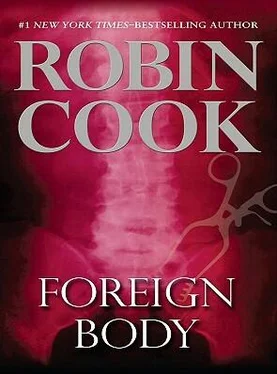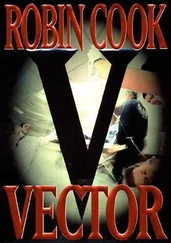“Luckily, there doesn’t seem to be any threat of hyperstimulation in this cycle or those in the past, so I want you to continue with the same dosage with your injections. If your hormone level is too high in the blood sample we drew today, I’ll call and make the necessary adjustments. Otherwise, stay the course. You’re doing terrific. I feel good about this cycle.”
“That’s what you said last month.”
“I did say that because I did feel good last month, but I feel better this month with that left ovary of yours getting more into the act.”
“What is your guesstimate in terms of my taking the trigger injection and having the intrauterine insemination? Jack likes a little warning about when he’s going to be required to step up to the plate.”
“Considering the current size of the follicles, I’d say maybe five or six days. Have the front desk schedule another ultrasound and estradiol for two or three days from now, whatever’s most convenient. I’ll be able to give you an even better estimate.”
“And one other thing,” Laurie said, as Dr. Schoener was about to leave. “Last night I was lying in bed unable to go back to sleep when the question dawned on me about my job. Do you think that there could be any environmental issues at the morgue that could be contributing to this infertility problem, like fixatives for tissue samples or something like that?”
“I doubt it,” Dr. Schoener said without hesitation. “If pathologists had more infertility than other docs, I think I would have heard of it. Remember, I see a lot of docs around the med center, including a few pathologists.”
Laurie thanked her friend, gave her a quick hug, and then ducked into the changing room where she’d left her clothes. The first thing she did was get out her watch. It was not quite eleven-thirty, which was perfect. It meant she’d be getting back to the medical examiner’s office just about noon, the time she gave herself her daily hormone shot.
October 15, 2007
Monday, 9:30 a.m.
Los Angeles, USA
(20 Minutes After Laurie Gives Herself Her Hormone Injection)
The cell phone’s vibration caught Jennifer completely off guard because she’d totally forgotten she’d slipped it into the pocket of her scrub pants instead of leaving it in her locker. As a consequence she jumped, and it was enough to catch her new preceptor’s attention. His name was Dr. Robert Peyton. Since he’d made her adequately aware that she’d started on the wrong foot in his estimation when she’d been almost four minutes late on the first day, the vibrating phone, which could be heard faintly, was a potential disaster. She shoved her hand into her pocket to try to calm the insistent device, but she couldn’t. Unable to determine quickly enough the phone’s orientation, she couldn’t connect with the appropriate button.
Jennifer, along with Dr. Peyton, who was an elegant man with marquee good looks, and seven of Jennifer’s classmates who’d signed up for the same elective, was standing in the mausoleum stillness of the anesthesia supply room situated between operating rooms number eight and ten, discussing the coming month’s schedule. The eight-person group was to be divided into four pairs and assigned weeklong rotations in various surgical specialties, including anesthesia. To Jennifer’s chagrin, she and another student had been assigned to anesthesia. She felt that if she’d wanted anesthesia, she would have chosen it for the whole rotation. But because of the bumpy start she’d had from being late, she’d not complained.
“Is there something the young lady would like to share with the group in reference to her very apparent startle and her apparent need to bring her cell phone into the OR?” Dr. Peyton questioned, with a taunting tone and with what seemed to Jennifer an uncalled-for hint of sexism. She was tempted to give the man an appropriate response but thought better of it. Besides, the continuing vibration of the phone dominated her thoughts. She could not imagine who could be calling her unless it had something to do with her grandmother. Impulsively and despite everyone’s attention directed at her, she pulled the phone from her pocket, mainly to quiet it, but in the process glanced at the LCD screen. Instantly, she could see it was an international call, and having called the number so recently, she knew it was the Queen Victoria Hospital.
“I beg everyone’s pardon,” Jennifer said. “I have to take this call. It’s about my grandmother.” Without waiting for a response from Dr. Peyton, she rushed out through the door into the OR’s central corridor. Sensing that even having a phone in the OR might have been considered a major no-no as she flipped it open and put it to her ear, she said, “Hold the line for a moment!” Then she ran toward the double bidirectional entrance doors. It wasn’t until she got to her earlier location in the locker room that she tried to have a conversation. She started by apologizing.
“It is no bother,” a rather high-pitched Indian voice said. “My name is Kashmira Varini, and you left a message on my voicemail. I am Maria Hernandez’s case manager.”
“I did leave a message,” Jennifer admitted. She could feel her abdominal muscles tense as to why the woman was calling. Jennifer knew it wasn’t a social call, since it must have been close to midnight in New Delhi.
“I’m calling you as you instructed. I have also just finished speaking to your father, and he advised me to call as well. He said you should be in charge.”
“In charge of what?” Jennifer asked. She knew she was playing dumb to an extent and postponing the unthinkable. The call had to be about Maria’s condition, and there was little chance of it being good news.
“In charge of arrangements. I’m afraid Maria Hernandez has passed away.”
For a moment Jennifer couldn’t speak. It seemed impossible that her grandmother could be dead.
“Are we still connected?” Kashmira questioned.
“I’m still here,” Jennifer answered. She was thunderstruck. She could not believe a day that had started out so promising was turning out so disastrous. “How can this be?” she complained irritably. “I just called your hospital maybe an hour and a half ago and was assured by the operator that my grandmother was doing just fine. I was told she was even eating and had been mobilized.”
“I’m afraid the operator did not know. All of us here at the Queen Victoria Hospital are terribly sorry about this most unfortunate state of affairs. Your grandmother was doing splendidly, and the operation to replace her hip was a complete, unqualified success. No one expected this outcome. I hope you will accept our most sincere sympathies.”
Jennifer’s mind was in a near paralysis. It was almost as if she’d been hit on the head.
“I know this is a shock,” Kashmira continued, “but I want to assure you that everything was done for Maria Hernandez that could have been done. Now, of course—”
“What did she die of?” Jennifer suddenly demanded, interrupting the case manager.
“I’m told by the doctors it was a heart attack. With no warning whatsoever of any problems, she was found in her room unconscious. Of course a full resuscitation attempt was made, but unfortunately with no response.”
“A heart attack doesn’t seem to me to be particularly likely,” Jennifer said, as her raw emotions spilled over into anger. “I happen to know she had low cholesterol, low blood pressure, normal blood sugar, and a perfectly normal cardiogram. I’m a medical student. I made sure she’d had an A-plus physical here at the UCLA Medical Center only months ago when she visited me.”
“One of the doctors mentioned she’d had a history of a heart arrhythmia.”
Читать дальше












